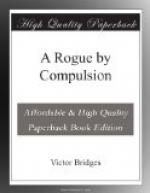All the same the incident had left a kind of uncomfortable feeling behind it. I suppose an escaped convict is naturally inclined to be suspicious, and somehow or other I couldn’t shake off the impression that I was being watched and followed. If so, I had not much doubt whom I was indebted to for the honour. It had never seemed to me likely that McMurtrie would leave me entirely to my own sweet devices while I was in London—not, at all events, until he had satisfied himself that I had been speaking the truth about my intentions.
Still, even if my suspicions were right, there seemed no reason for being seriously worried. The gentleman on the pavement might have overheard me give the address to the driver, but that after all was exactly what I should have liked him to hear. Dinner at Gaultier’s sounded a most natural preliminary to an evening’s dissipation, and unless I was being actually followed to the restaurant I had nothing to fear. It was quite possible that my friend with the scar was only anxious to discover whether I was really setting out for the West End.
All the same I determined to be devilish careful about my future movements. If McMurtrie wanted a report he should have it, but I would take particular pains to see that it contained nothing which would in any way disturb his belief in me.
We pulled up at Gaultier’s, and I saw with a sort of sentimental pleasure that, outside at all events, it had not altered in the least during my three years’ exile. There was the same discreet-looking little window, the same big electric light over the door, and, unless I was much mistaken, the same uniformed porter standing on the mat.
When I entered I found M. Gaultier himself, as fat and bland as ever, presiding over the scene. He came forward, bowing low after his usual custom, and motioned me towards a vacant table in the corner. I felt an absurd inclination to slap him on the back and ask him how he had been getting on in my absence.
It seemed highly improbable that he would remember my voice, but, as I had no intention of running any unnecessary risks, I was careful to alter it a little when I spoke to him.
“Good-evening,” I began; “are you M. Gaultier?”
He bowed and beamed.
“Well, M. Gaultier,” I said, “I want a good dinner—a quite exceptionally good dinner. I have been waiting for it for some time.”
He regarded me keenly, with a mixture of sympathy and professional interest.
“Monsieur is hungry?” he inquired.
“Monsieur,” I replied, “is both hungry and greedy. You have full scope for your art.”
He straightened himself, and for an inspired moment gazed at the ceiling. Then he slapped his forehead.
“Monsieur,” he said, “with your permission I go to consult the chef.”
“Go,” I replied. “And Heaven attend your council.”
He hurried off, and I beckoned to the head waiter.




